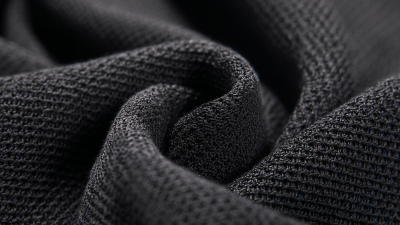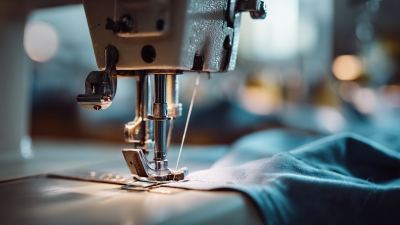- +86 13957580925
- 510515850@qq.com
- adela0928@163.com
In the realm of modern manufacturing, "Pure Polyester" has emerged as a transformative material, revolutionizing various industries with its unique properties and applications. Recent reports indicate that the global polyester market is projected to reach approximately $200 billion by 2025, driven by its versatility and efficiency (Grand View Research, 2021). Pure Polyester is not only known for its durability and resistance to environmental factors, but it also offers remarkable advantages in terms of sustainability, as it can be recycled and repurposed effectively. This material is increasingly utilized in sectors ranging from textiles to automotive, where it contributes to lightweight designs and enhanced performance. As manufacturers seek innovative solutions to meet the evolving demands of the market, exploring the unique applications of Pure Polyester becomes essential for driving progress and addressing the pressing challenges faced by various industries today.

The rise of pure polyester in high-tech industries marks a significant shift towards innovative materials tailored for advanced manufacturing. According to a report by Grand View Research, the global polyester market is projected to reach USD 98.7 billion by 2025, driven by its superior properties such as durability, lightweight nature, and resistance to various chemicals. In sectors like aerospace and automotive, pure polyester composites are being utilized for parts that require high strength-to-weight ratios, enabling better fuel efficiency and performance in vehicles.
Moreover, the textile industry is witnessing a revolution with the integration of pure polyester in wearable technology. Research from MarketsandMarkets indicates that the global smart textiles market is expected to grow from USD 2.4 billion in 2020 to USD 5.5 billion by 2025, showcasing the increasing application of polyester in creating smart clothing that can monitor health metrics and enhance user comfort. These innovative uses of pure polyester are not only shaping modern manufacturing practices but also enhancing product functionality across various high-tech industries.
Pure polyester has emerged as a game-changer in modern manufacturing, offering a range of advantages over traditional materials like cotton and nylon. One significant benefit is its superior durability. According to a report from the Textile World Journal, pure polyester exhibits a tensile strength that can exceed that of conventional textiles by up to 50%. This strength not only enhances the lifespan of products but also reduces the frequency of replacements, thereby lowering long-term costs for manufacturers.
Another key advantage of pure polyester is its resistance to environmental factors, including moisture, mold, and UV light. Research from the American Chemistry Council indicates that polyester's inherent properties allow it to retain its shape and color even after prolonged exposure to harsh conditions. This characteristic makes it an ideal choice for outdoor applications, where traditional materials might succumb to the elements. Additionally, the lightweight nature of pure polyester translates to energy savings in production and transportation, further solidifying its position as a preferred material in various sectors.
In recent years, the shift towards sustainable manufacturing practices has highlighted the environmental benefits of using pure polyester. As a lightweight, durable, and chemically resistant material, pure polyester has gained popularity in various industries. Its production process has evolved to incorporate recycling methods, which significantly reduce the environmental footprint. By opting for recycled polyester, manufacturers can diminish waste and decrease reliance on virgin materials, fostering a circular economy.
Tip: When selecting polyester products for manufacturing, look for certifications that verify their recycled content. This ensures that the materials used are genuinely sustainable and contribute to reducing environmental impact.
Moreover, pure polyester's recyclability not only conserves natural resources but also minimizes energy consumption during the manufacturing process. By using recycled polyester, companies can lower carbon emissions associated with production. Additionally, polyester's long-lasting nature reduces the frequency of replacement, leading to less material waste over time.
Tip: Implement a take-back program for polyester products, enabling customers to return used items for recycling. This initiative not only promotes sustainability but also enhances brand loyalty by showing commitment to environmental responsibility.

In modern manufacturing, the use of pure polyester has surged due to its impressive cost-effectiveness, particularly in large-scale production environments. According to a report by Smithers Pira, polyester is one of the most widely utilized synthetic fibers, accounting for approximately 50% of global textile production. Its versatility not only lowers material costs but also enhances production efficiency; with automated processes, manufacturers can now produce polyester products at a reduced cycle time, increasing output without compromising quality.
Additionally, the durability and chemical resistance of pure polyester contribute to lower long-term costs. A study by the Textile Outlook International highlights that the longevity of polyester products results in fewer replacements needed, which can save companies up to 30% in material costs over five years. With the demand for sustainable and affordable materials on the rise, manufacturers are increasingly turning to pure polyester, not just for its economic advantages but also for its environmental benefits, as recycling polyester can significantly reduce waste and resource consumption in production processes.
The shift toward sustainable manufacturing practices has prompted industries to explore innovative materials that minimize environmental impact. Pure polyester has emerged as a frontrunner in this movement, offering numerous advantages in terms of recyclability and durability. Its lightweight nature not only reduces energy consumption during transportation but also extends the lifespan of products, thereby reducing waste. As manufacturers seek to balance performance with ecological responsibility, pure polyester provides a solution that aligns with green initiatives.
Future trends indicate an increasing integration of pure polyester in various sectors, including fashion, automotive, and construction. Companies are investing in research to develop bio-based polyester derived from renewable resources, which could further decrease their carbon footprint. Additionally, advancements in recycling technologies allow for the transformation of post-consumer polyester products back into raw materials, creating a closed-loop system that enhances sustainability. As these practices gain momentum, pure polyester will play a crucial role in redefining manufacturing processes, making them more environmentally friendly while still meeting the demands of modern consumers.







